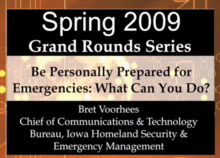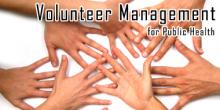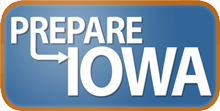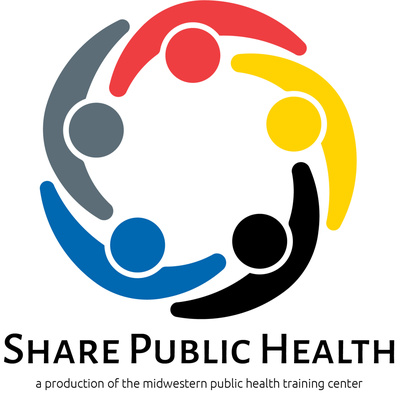Emergency Preparedness Plans
Be Personally Prepared for Emergencies: What Can You Do |
This webcast originally occurred live on: Wednesday, July 15, 2009 and is now presented in archived format. Related Websites: FEMA - Are You Ready? | Be Ready Iowa Program Goal Bret Voorhees, chief of the Communications and Technology Bureau in the Iowa Homeland Security and Emergency Management Division, will... More About This Course |
Volunteer Management for Public Health |
Course SummaryThere are five sections in this course:
There are review questions at the end of modules. These review questions will provide you with an opportunity to apply the knowledge and skills presented in... More About This Course |
Overall Aspects of Managing an Agency |
The University of Iowa College of Public Health's Upper Midwest Public Health Training Center (UMPHTC), in cooperation with the Iowa Counties Public Health Association (ICPHA), has developed a series of practiced-based educational programs targeted toward new public health administrators and nursing administrators. The programs are part of the Institute's continuing effort to provide training to strengthen the skills and knowledge of the current public health workforce Intended...More About This Course |
Knowledge of Public Health |
Course SummaryThe University of Iowa College of Public Health's Upper Midwest Public Health Training Center (UMPHTC), in cooperation with the Iowa Counties Public Health Association (ICPHA), has developed a series of practiced-based educational programs targeted toward new public health administrators and nursing administrators. The programs are part of the Institute's continuing effort to provide training to strengthen the skills and knowledge of the current public health... More About This Course |
Ready or Not: A Family Preparedness Scenario |
This course provides training in emergency preparedness for the families of first responders, focusing on protective actions your family can take prior to a disaster Intended Audiencelocal public health administrators and local county emergency managers. Learning Objectives:Upon completion of this part, you will be able to:
|
IS-1300: Introduction to Continuity of Operations |
This course is intended to lay the foundation of knowledge for students who wish to increase their understanding of continuity and building a comprehensive continuity program in their organization or jurisdiction. This course will replace IS-546.A Continuity of Operations Awareness Course and IS-547.A Introduction to Continuity of Operations. IS-546 and IS-547 contain outdated materials and information, are redundant (they... More About This Course |
IS 26 - Guide to Points of Distribution |
Course SummaryThis guide was developed to support the Points of Distribution (POD) overview video and provide an in depth look into the planning, operations, and demobilization stages of a POD mission. The lessons detail the staffing and procedures any state will need to plan for, execute, and shut down POD operations. The guide also includes key lessons such as safety, equipment, and resource accountability and informs the reader about the “Adopt a POD” program being used by the... More About This Course |




